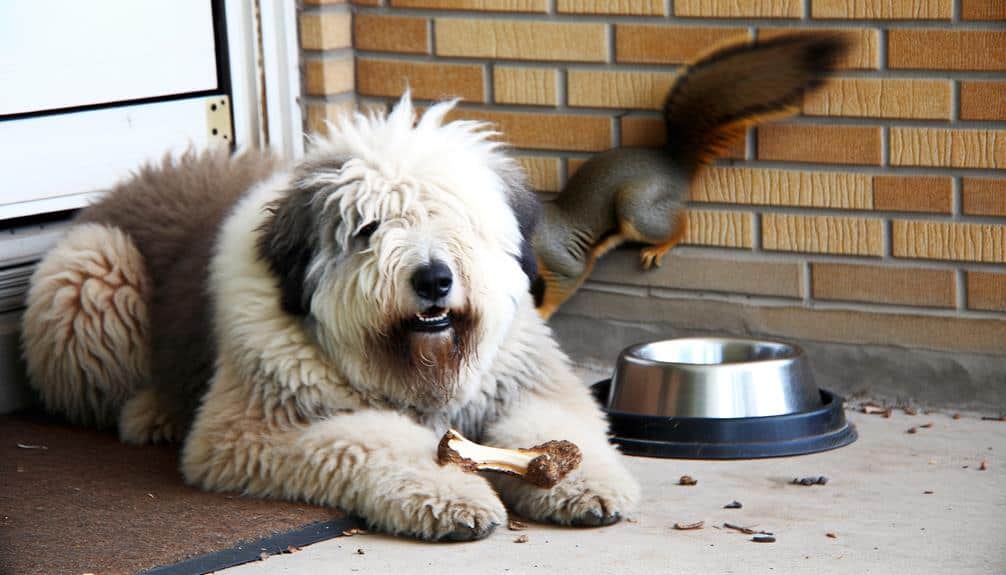While the unequivocal loyalty and companionship offered by our canine companions cannot be disputed, the suitability of certain breeds in the role of a guard dog warrants further investigation. Indeed, an array of factors, such as inherent temperament, physical stature, and instinctive response to perceived threats, can drastically impact a dog’s effectiveness as a protector.
It is within this context that we explore the argument that certain breeds – despite their many admirable qualities – may not be ideally suited to roles requiring a high degree of protective instinct and intimidation. This discourse invites you to consider, in turn, the characteristics of various popular breeds and their potential – or lack thereof – in the capacity of guard dogs.
Key Takeaways
- Labrador Retrievers, Golden Retrievers, Old English Sheepdogs, Pugs, English Bulldogs, and Saint Bernards are not suitable as guard dogs due to their friendly and sociable nature.
- These breeds prioritize human interaction over territorial defense, making them ineffective for guarding purposes.
- Basset Hounds, Bloodhounds, and Golden Retrievers also lack aggression and territorial instincts, making them unsuitable for guarding.
- Factors such as lack of territorial instincts, high need for social interaction, and minimal protective instinct contribute to the ineffectiveness of these breeds as guard dogs.
Friendliest Dog Breeds
While many dogs are equipped with a natural instinct to protect, breeds such as Labrador Retrievers, Golden Retrievers, and Old English Sheepdogs, are renowned for their friendly, sociable nature, making them more likely to befriend strangers rather than guarding against them. These breeds, along with Pugs, English Bulldogs, and Saint Bernards, distinguish themselves as some of the friendliest dog breeds, prioritizing human interaction over territorial defense.
Golden Retrievers, as an example, are known for their amiable, gentle demeanor. Their lack of aggressive and suspicious traits make them ineffective as guard dogs, but exceptional as family pets. Their tendency to display love and affection, rather than hostility, contributes to their reputation as one of the friendliest dog breeds.
Other breeds, like the Havanese and Irish Setter, also lack the territorial instincts necessary for protection. However, what these breeds lack in guarding capabilities, they compensate for with their affable and non-threatening demeanor. This trait makes them more inclined to make friends than guard property, reinforcing their status as friendly, sociable dogs. As such, these breeds are highly recommended for families and individuals seeking companionship and a sense of belonging, rather than protection.
Labrador Retriever Characteristics
Labrador Retrievers are renowned for their sociable and friendly temperament. Traits which, while endearing, do not lend themselves well to the responsibilities of a guard dog. Their lack of territorial instincts and preference for human interaction over property protection further hinder their efficacy in this role.
Therefore, despite their popularity as a breed, Labrador Retrievers fall short in serving as effective guard dogs.
Labrador Retriever Traits
What might one observe when considering the character traits of Labrador Retrievers?
These dogs are not good guard dogs, in fact, they are considered among the worst guard dogs due to their innate Labrador Retriever traits.
These lovable canines are known for their sociable and friendly nature, making them perfect companions for family and friends.
Rather than displaying territorial instincts or aggression, they show an overwhelming interest in human interaction.
This lack of suspicion and aggression, essential characteristics for guard dog roles, makes Labradors ineffective in such situations.
Their desire to make friends, combined with their non-threatening demeanor, further underscores their unsuitability for guarding purposes.
Thus, their traits make them excellent family pets, but less effective guardians.
Labradors as Guard Dogs
Despite their amiable disposition, considering Labradors as guard dogs reveals a different perspective on their characteristic traits, specifically their lack of natural protective instincts. This breed radiates an affable nature, possessing a friendly and sociable demeanor that seemingly overrides their ability to guard.
Their proclivity for human interaction and their absence of territorial instincts further undermine their utility as guard dogs. An empirical analysis of their behavior indicates that Labradors prioritize companionship over protection. They lack the aggression typically associated with effective guard dogs, and their protective instincts are not as pronounced.
The conclusion is clear: although Labradors excel in many areas, their characteristics do not lend themselves to be effective guard dogs.
Basset Hound Traits

Renowned for their friendly and sociable nature, Basset Hounds exhibit a non-threatening demeanor which, while endearing, renders them unsuitable for roles requiring territorial instincts such as guarding. Their charming personality, coupled with their lack of aggression, makes them more inclined towards human interaction rather than guarding. Basset Hounds, unlike certain large dogs, are not effective as guard dogs.
When you need something more than just a pet and are trying to choose the best guard dog, the traits of a Basset Hound may not meet your requirements. Their lack of territorial instincts and their propensity to befriend, rather than deter, potential intruders are factors to consider.
| Basset Hound Traits | Suitability as Guard Dogs | Other Large Dogs |
|---|---|---|
| Friendly and sociable | Not suitable | Varies |
| Non-threatening demeanor | Unlikely to deter intruders | Some can be intimidating |
| More inclined to human interaction | More interested in making friends | Some are more territorial |
| Lack of territorial instincts | More likely to welcome than guard | Some can be very protective |
Analyzing the Bloodhound
Shifting our focus from the Basset Hound, we now turn our attention to the Bloodhound, another breed whose traits do not lend themselves well to guard dog duties. Originally bred for their exceptional tracking abilities, these large dogs are known more for their friendliness and sociability than for their guarding capabilities.
Here are four key reasons why Bloodhounds do not make excellent guard dogs:
- Bloodhounds have a friendly and non-threatening demeanor. Their general disposition is to greet strangers with wagging tails instead of growls, making them unlikely to deter intruders.
- Their lack of aggression is noticeable. They often prefer making friends over asserting dominance, which is not a great guard dog trait.
- Despite being a large dog, a Bloodhound’s size does not translate into intimidation. Their friendly expressions and kind eyes do not inspire fear.
- They lack strong territorial instincts. A Bloodhound is more likely to lead a stranger to the treat jar than guard the property.
Golden Retriever Personality

Examining the personality traits of Golden Retrievers, it becomes evident that their friendly and sociable disposition does not align with the typical characteristics of a guard dog. Their inherent eagerness for human interaction and lack of territorial instincts make them less suitable for guarding purposes.
However, their loyalty and trainability, while not conducive to guard duties, lend themselves well to roles centered around companionship and service.
Golden Retriever’s Friendly Nature
Despite their reputation for being wonderful family pets, Golden Retrievers, due to their inherently friendly and sociable nature, are not ideally suited for the role of guard dogs. Here’s why:
- Golden Retrievers lack the territorial instincts that make the best guard dogs.
- Instead of guarding, their primary interest lies in human interaction and companionship.
- Their friendly and non-threatening demeanor makes them more likely to greet an intruder than to deter them.
- Even with training classes, it’s hard to override their innate affability.
In essence, while Golden Retrievers are one of the best family pets, their friendly nature makes them less suitable as guard dogs. Their love for companionship and sociability outweighs their potential as protectors.
Training Challenges for Retrievers
Navigating the training landscape for Golden Retrievers presents unique challenges due to their inherently sociable temperament and lack of territorial instincts, which significantly hinders their effectiveness as guard dogs. While these dogs are not good guard dogs, they excel in roles that require interaction, mental and physical stimulation. Their energy levels and need for exercise can also make them difficult to train for sedentary roles like guarding.
| Challenges | Solutions |
|---|---|
| Lack of territorial instincts | Targeted training to develop protective instincts |
| High need for social interaction | Provide ample socialization opportunities |
| High energy levels and need for exercise | Regular exercise and tasks that channel energy positively |
Implementing these strategies can help address the training challenges for retrievers. However, their natural inclinations may still make them less effective as guard dogs.
Guarding Instincts: Retriever’s Perspective
In an exploration of a Retriever’s guarding instincts, particularly focusing on the Golden Retriever’s personality, it becomes evident that their friendly and sociable nature often outweighs any inherent protective instincts they may have. From a retriever’s perspective, these dogs are not good guard dogs due to several factors:
- Lack of territorial instincts: Retrievers are sociable breeds, which often hinders their natural instinct to protect.
- Non-aggressive nature: Their friendly demeanor can lead to lack of suspicion towards strangers, making them ineffective as guard dogs.
- Size and lack of intimidation: Potential intruders may not feel threatened by their small stature.
- Distraction tendency: Retrievers can be easily diverted in stressful situations, undermining their guarding capabilities.
Hence, while dogs have a natural instinct to protect, these may not be predominant in retrievers.
Features of Old English Sheepdog

Characterized by their amicable and sociable disposition, Old English Sheepdogs unfortunately lack the fundamental traits required for effective guarding, such as territorial instincts and a natural propensity towards protectiveness. As a large breed, they are more inclined towards forming strong bonds with their family members, rather than exhibiting the temperament and traits needed to serve as a suitable guard dog.
Their friendly demeanor and lack of suspicion towards strangers further underscore their unsuitability for the role. Despite their substantial size and strength, they are more interested in socializing and engaging in playful activities than standing guard. They need a lot of interaction, love, and a lot of exercise to be truly content and healthy.
The table below provides a summary of the key features of Old English Sheepdogs:
| Trait | Old English Sheepdog | Ideal Guard Dog |
|---|---|---|
| Size | Large Breed | Large Breed |
| Temperament | Sociable, Amicable | Protective, Alert |
| Interaction with Strangers | Friendly | Suspicious |
| Exercise Needs | High | Varies |
| Suitability as Guard Dog | Low | High |
Pugs and Security
Shifting our focus from the Old English Sheepdog to the Pug, it becomes apparent that this breed also lacks the essential characteristics that would make them effective guard dogs. As small dogs, their physicality does not strike fear or intimidation, key aspects of personal protection. Their size and gentle demeanor do not meet the requirements of a guard dog, making pugs and security an unlikely pairing.
This is evident when we consider the following:
- Lack of territorial instinct: Unlike breeds bred for guarding, Pugs do not have a strong territorial instinct. They are less likely to see strangers as threats, reducing their effectiveness in a security role.
- Preference for human interaction: Pugs thrive on human interaction. Their sociability can overshadow their protective instincts, making them less reliable as guard dogs.
- Friendly and sociable nature: These dogs are not good guard dogs because their friendly and sociable nature can easily be manipulated by intruders.
- Easily distracted and scared: Pugs can be easily distracted or scared, further compromising their potential as guard dogs.
In essence, while Pugs make loving and charming pets, their suitability for security roles is minimal.
St. Bernard’s Protective Instincts

Turning our attention towards the St. Bernard breed, it is important to note that their protective instincts are minimal, largely due to their friendly and sociable nature. Unlike the best guard dog breeds, St. Bernards are more inclined towards human interaction than territorial protection.
Their lack of natural aggression, suspicion towards strangers, and territorial instincts makes them ineffective as guard dogs. Their affable and non-threatening demeanor means they are unlikely to deter intruders, emphasizing the fact that St. Bernard’s protective instincts are not their predominant trait.
| Breed | Protective Instinct | Best Suited Role |
|---|---|---|
| St. Bernard | Minimal | Companion |
| Rottweiler | High | Guard Dog |
| German Shepherd | High | Guard Dog |
Contrarily, breeds like Rottweilers and German Shepherds are known for their high protective instincts, making them some of the best guard dogs. It’s crucial to understand the inherent traits of each breed to determine what role they’re best suited for. In the case of St. Bernards, they are best suited as family companions, not guard dogs. Their gentle, warm, and friendly nature makes them ideal for families seeking a sociable and loving pet.
Frequently Asked Questions
Which Dogs Are Not Guard Dogs?
Chihuahuas, due to their vulnerability, Greyhounds for their gentleness, Bulldogs for their friendliness, and Dalmatians for their sociability, are all breeds that do not typically serve as effective guard dogs.
What Is the Meanest Guard Dog in the World?
The Fila Brasileiro, often likened to a ticking time bomb for its explosive guard dog aggression, tops the list of meanest guard dogs. Its dog behavior analysis reveals a breed requiring careful dog training methods.
What’s the Scariest Guard Dog?
Assessing the ‘scariest’ guard dog involves analyzing breed temperament differences, dog training challenges, and debunking guard dog myths. It’s crucial to understand that canine fear responses don’t necessarily equate to effective guarding capabilities.
What Is No 1 Guard Dog?
The German Shepherd ranks as the top guard dog, a testament to their breed temperament and rigorous guard dog training. Their socializing skills and optimal guard dog nutrition further contribute to their exemplary performance in protection roles.
Conclusion
In conclusion, breeds such as Labrador Retrievers, Basset Hounds, Bloodhounds, Golden Retrievers, Old English Sheepdogs, Pugs, and St. Bernards are less than ideal for guarding purposes due to their inherent traits.
Their friendly demeanors, lack of aggression, and smaller stature inhibit their ability to protect properties effectively.
Consequently, potential dog owners seeking protective pets should consider these factors, thereby ensuring their choice aligns with their needs.
This alludes to the ancient adage, ‘not all that glitters is gold.’